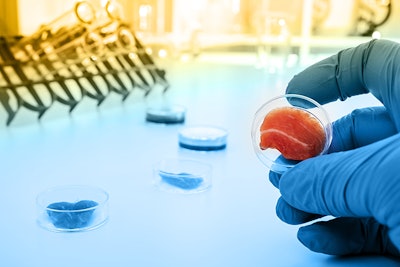
Cultured meat could be a bigger threat to animal proteins than plant-based alternatives, claimed Nick Lin-Hi, Professor of Economics and Ethics at the University of Vechta, Germany.
The economist shared his thoughts and opinions on why meat from the laboratory could disrupt traditional agriculture during “Star Trek: Will the meat of the future come from the lab?” at Eurotier.
Modern food production is facing two major challenges, Lin-Hi said. The first is sustainability, a factor that consumers consistently rank as important. The second will be finding a way to feed an ever-growing global population.
Is cultured meat the future?
Lin-Hi called cultured meat a revolutionary technology that could produce food that is both more sustainable and easier to produce than current methods.
Cultured meat is made with biopsied animal cells that are grown with the help of a culture medium in a stainless-steel tank known as a bioreactor, resulting in a product that resembles the taste, appearance and texture of chicken, beef, pork and other meats.
Lab-grown meat, long thought of as the stuff of science fiction, is quickly becoming a reality, he explained.
U.S. startup Eat Just Inc. made headlines in 2020 when the company received regulatory approval to sell its lab-grown chicken nuggets commercially within the city-state of Singapore. The December 1 announcement marked the first time worldwide that cultured meat received the green light for human consumption.
Regulatory approval in other countries could soon follow.
Prediction: Price parity is coming
The high production costs associated with cultured meat production have been one of the biggest barriers to commercialization. The first burger made of cultured animal cells cost more than $280,000, too expensive for the majority of consumers.
Cultured meat could achieve price parity with traditional animal proteins by the year 2025. Once this goal is reached, prices should continue to fall, Lin-Hi predicted.
Lin-Hi encouraged the animal protein industry to get involved and collaborate with cultured meat startups, noting that they have the possibility to become a part of a the future food chain.
Like what you just read? Sign up now for free to receive the Poultry Future Newsletter.


















